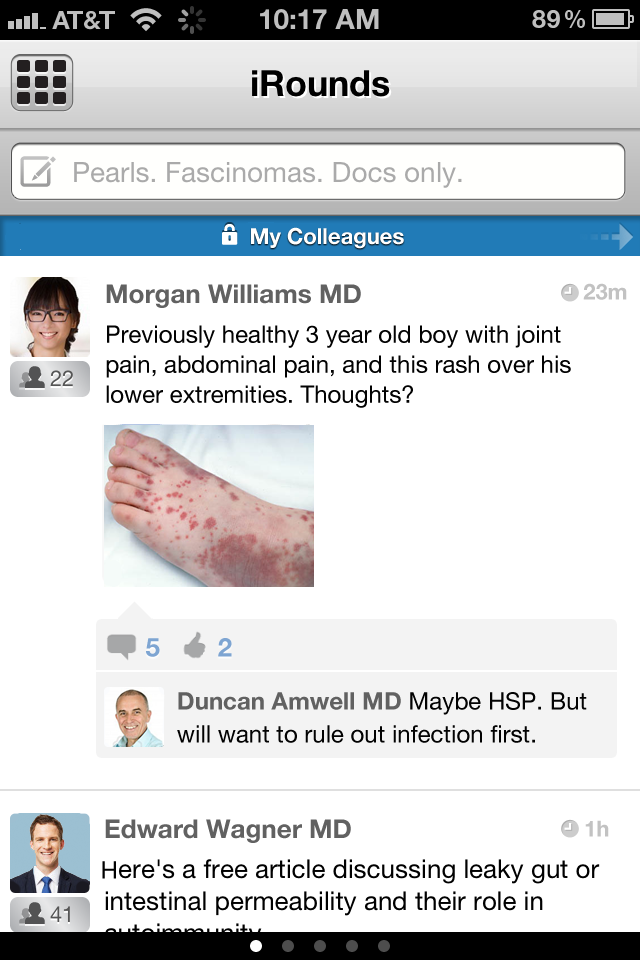
Physicians and other medical professionals have a lot to remember and are always craving tools and methods of keeping all of their necessary references close without weighing down their white coats.
Mobile technology has been one of the most promising solutions to many medical organizational problems, and because of that, the mobile health market has been forecasted to exceed $400 million in the next four years.
From iPhone drug references to medical calculators and even charting solutions, iPhones, tablets and Androids have taken the place of bulky clipboards — and still allow doctors to check their email and make phone calls.
In fact, some residents and students in medical school are finding smart phones and tablets as required tools of the trade that they either have to purchase or are doled out at the beginning of a course segment.
But, because of health care regulations, most notably HIPAA, creating social networks where doctors can connect and share expertise has been all too hard to attain, until recently.
I spoke with the Alexander Blau, medical director of the newest social networking platform, Doximity, and he was proud to say that his company has seen wide adoption of the network by medical professionals across the country.
Doximity launched earlier this year under the guidance of Jeff Tangney, co-founder and former president of NASDAQ-listed mobile health app maker, Epocrates.
Doximity is poised to become the LinkedIn of the medical community, with more than 30,000 users as of Wednesday, allowing M.D.s to network, refer patients, share medical articles, discuss business practices and even discuss particular patients.
“Physicians were working in the Dark Ages of fax machines and white boards for so long since regulations like HIPAA limit communications so greatly,” said Blau. “But since we have such tight security and know how to adhere to the health care regulations, we are allowing doctors to communicate freely for the first time on such a large scale.”
With access via iPhone, Android and Web browser, Doximity is giving health care professionals a network where they can share information and provide better care to their patients.

There have been other attempts to create physician networks online, but most of those efforts pressed for or required anonymity of the physicians — so it cut out the value of networking and creating references.
Blau said that the average physician may refer their patients to upwards of 200 specialists and that creating a network that is accessible via mobile device or Internet browser can save physicians and their patients time and frustration.
While the greatest number of physicians using the service are from the major cities and states in the U.S., some of the highest penetration comes from more rural locations like Alaska.
“In a way, the rural doctors may get the most benefits from our services,” said Blau. “Because they are often in such remote locations that they have few other mode of networking or the ability to consult a specialist. On our site they can actually upload a photo or description and get hundreds or thousands of second opinions or insights.”
 Doximity is a venture-backed service, having raised $10 million so far, and is entirely free so for licensed practitioners to join. The San Mateo-based company is still young and scrappy, with 20 employees and an interest in growing slow but strong.
Doximity is a venture-backed service, having raised $10 million so far, and is entirely free so for licensed practitioners to join. The San Mateo-based company is still young and scrappy, with 20 employees and an interest in growing slow but strong.
Their 30,000 user milestone represents approximately 5% of physicians in the U.S. — and for seven months of recruiting, that is a huge feat.
Since iPads and other tablets are the looking like the wave of the future of medicine, Blau told me that they are in the development process to create and iPad version of their platform so that doctors can quickly move from virtual charting to communicating with their peers and then back to charting without hassle.
“We are in this exciting space of health care, that claims up 20% of U.S. GDP and its only just embarking into new technology and media,” said Blau. “There are so many more benefits physicians will be able to take advantage of once they get access to more mobile health assistance and Doximity is happy to be one of them.”
Image Source — Supplements-daily.com


















